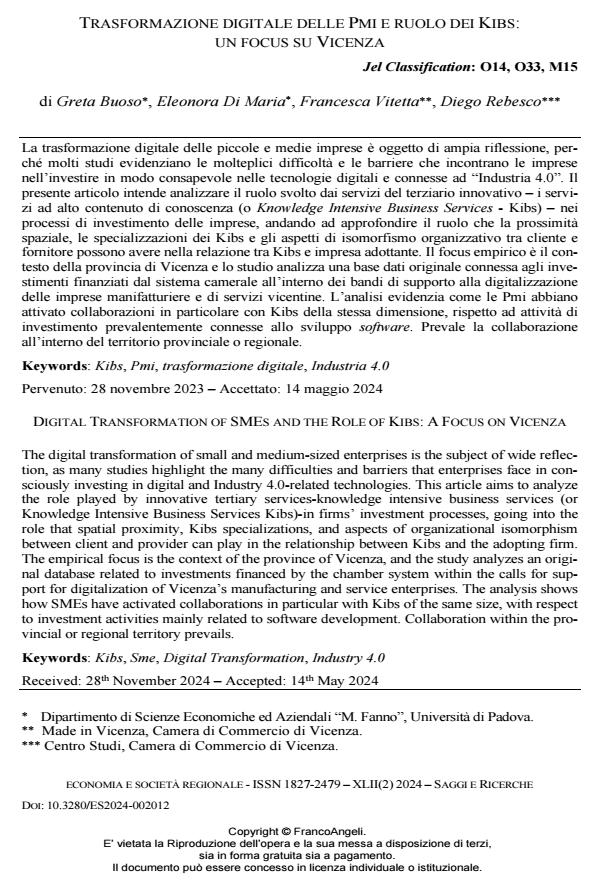Trasformazione digitale dellePMI e ruolo dei kibs: un focus su Vicenza
Titolo Rivista ECONOMIA E SOCIETÀ REGIONALE
Autori/Curatori Greta Buoso, Eleonora Di Maria, Francesca Vitetta, Diego Rebesco
Anno di pubblicazione 2024 Fascicolo 2024/2
Lingua Italiano Numero pagine 19 P. 163-181 Dimensione file 882 KB
DOI 10.3280/ES2024-002012
Il DOI è il codice a barre della proprietà intellettuale: per saperne di più
clicca qui
Qui sotto puoi vedere in anteprima la prima pagina di questo articolo.
Se questo articolo ti interessa, lo puoi acquistare (e scaricare in formato pdf) seguendo le facili indicazioni per acquistare il download credit. Acquista Download Credits per scaricare questo Articolo in formato PDF

FrancoAngeli è membro della Publishers International Linking Association, Inc (PILA), associazione indipendente e non profit per facilitare (attraverso i servizi tecnologici implementati da CrossRef.org) l’accesso degli studiosi ai contenuti digitali nelle pubblicazioni professionali e scientifiche.
La trasformazione digitale delle piccole e medie imprese è oggetto di ampia riflessione, perché molti studi evidenziano le molteplici difficoltà e le barriere che incontrano le imprese nell’investire in modo consapevole nelle tecnologie digitali e connesse ad “Indu-stria 4.0”. Il presente articolo intende analizzare il ruolo svolto dai servizi del terziario innovativo – i servizi ad alto contenuto di conoscenza (o Knowledge Intensive Business Services - Kibs) – nei processi di investimento delle imprese, andando ad approfondire il ruolo che la prossimità spaziale, le specializzazioni dei Kibs e gli aspetti di isomorfi-smo organizzativo tra cliente e fornitore possono avere nella relazione tra Kibs e impre-sa adottante. Il focus empirico è il contesto della provincia di Vicenza e lo studio analiz-za una base dati originale connessa agli investimenti finanziati dal sistema camerale all’interno dei bandi di supporto alla digitalizzazione delle imprese manifatturiere e di servizi vicentine. L’analisi evidenzia come le Pmi abbiano attivato collaborazioni in par-ticolare con Kibs della stessa dimensione, rispetto ad attività di investimento prevalen-temente connesse allo sviluppo software. Prevale la collaborazione all’interno del terri-torio provinciale o regionale.
Parole chiave:Kibs, Pmi, trasformazione digitale, Industria 4.0
Jel codes:O14, O33, M15
Greta Buoso, Eleonora Di Maria, Francesca Vitetta, Diego Rebesco, Trasformazione digitale dellePMI e ruolo dei kibs: un focus su Vicenza in "ECONOMIA E SOCIETÀ REGIONALE " 2/2024, pp 163-181, DOI: 10.3280/ES2024-002012